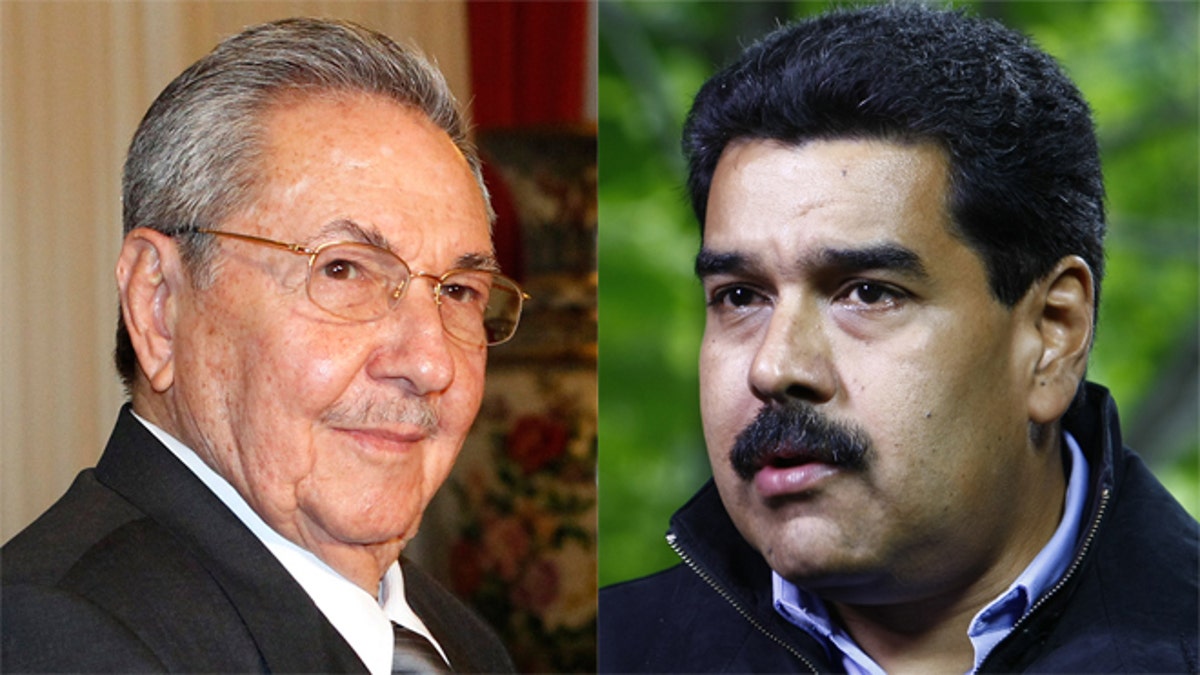
(Getty)
The announcement on Wednesday that the United States and Cuba are restoring diplomatic relations was met with widespread praise across the globe, including from one surprising source: Venezuelan President Nicolás Maduro.
The Venezuelan leader – a longtime foe of U.S. interest throughout Latin America - called Obama's action "a gesture that was courageous and historically necessary."
What this means for relations between Washington and Caracas – and Caracas and Havana, however, remain to be seen.
Cuba and Venezuela have been close allies ever since former Venezuelan President Hugo Chávez – a protégé of Fidel Castro’s ideas - came to power in 1999 and since then the two nations have jointly relied on each other, both economically and politically, on the world stage. For well over a decade Cuba has received heavily subsidized oil from their OPEC-ally – somewhere between 90,000-100,000 barrels every day – while Venezuela in turn got an influx of Cuban doctors and the historical and political clout of the Castro regime.
Many observers of relations between the two countries say that very little is likely to change between Havana and Caracas following Wednesday’s historic announcement that the U.S. and Cuba have restored diplomatic relations.
"It’s hard to believe that Cuba will stop propping up Venezuela," Susan K. Purcell, the director of the Center for Hemispheric Policy at the University of Miami, told Fox News Latino. "Cuba will never refuse Venezuela’s oil."
There is some speculation that given Venezuela’s tenuous economic and political situation that Maduro’s comments were made in the hope that there could also be a rapprochement in U.S.-Venezuelan relations. Venezuela has seen skyrocketing violent crime rates, soaring inflation and foreign businesses pulling out of the country. Economists recently have been talking about the possibility of a government default.
President Barack Obama signed Thursday legislation that allows him to levy sanctions against Venezuelan government officials involved in a crackdown on anti-government protesters, after the Senate passed the bill Monday evening and the House approved the measure by voice vote Wednesday evening.
It authorizes sanctions that would freeze the assets and ban visas of individuals accused of perpetrating acts of violence or violating the human rights of those opposing the South American country's socialist government. During the summer, the State Department imposed a travel ban on Venezuelan officials accused of abuses during a months-long street protest movement in the winter and spring that left dozens of people dead.
Maduro seems to be trying to restore relations with the U.S. even as the Obama administration continues to impose sanctions against Venezuela.
Maduro said on Wednesday during a trip to Argentina that Venezuela was "working and looking for the best ways for relations with the giant in the North to take the course they have to take, especially with news and fresh winds blowing through the Caribbean, for Cuba."
For Cuba, a country that already lost one major benefactor after the fall of the Soviet Union – its economy shrank 35 percent between 1989 and 1993 and oil imports decreased by 90 percent – leaders in the Castro government are closely monitoring the situation in Venezuela and weighing their options for the future. Some Venezuelans are also questioning the Maduro government’s subsidies to Cuba during their economic crisis, while arguing that a cut off to Cuba would be politically much easier than increasing energy prices for Venezuelans.
"The Cubans can see what is happening to their major benefactor and they're very concerned." Jason Marczak, the deputy director of the Adrienne Arsht Latin America Center at the Atlantic Council told FNL. 'The Cubans are looking out for their own self-interest and that involves dealing with their economy the best they can."
The Associated Press contributed to this report.
